QS+World+University+Ranking
-
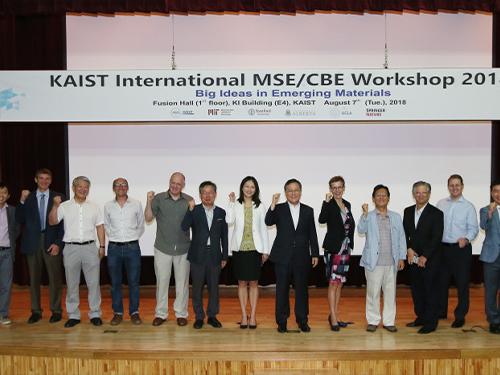 The MSE/CBE Int'l Workshop Explores Big Ideas in Emerging Materials
(KAIST President Sung-Chul Shin with scholars participated in the workshop)
The MSE/CBE International Workshop brought together editors from key academic journals in multidisciplinary materials science and scholars from leading universities at KAIST on Aug. 7.
The workshop hosted ten distinguished speakers in the fields of nanostructures for next-generation emerging applications, chemical and bio-engineering, and materials innovation for functional applications. They explored opportunities and challenges for reinventing novel materials that will solve complex problems.
(From left: Professor Buriak, Professor Swager and Professor Il-Doo Kim)
Speakers included: Chief Editor of Nature Materials Vincent Dusastre; Editor-in- Chief of ACS NANO and professor at UCLA Paul S. Weiss; Jillian M. Buriak, Editor-in-Chief of Chemistry of Materials; Associate Editor of Macromolecules and professor at MIT Timothy M. Swager; Coordinating Editor of Acta Materialia and Head of the Department of Materials Science and Engineering at MIT Christopher A. Schuh; Editor-in-Chief of Biotechnology Journal and Metabolic Engineering and Distinguished Professor at KAIST Sang-Yup Lee; Associate Editor of Energy Storage Materials and professor at KAIST Sang Ouk Kim; Professor Jeffrey C. Grossman at MIT; Professor Zhenan Bao at Stanford University; and Professor Hyuck Mo Lee, head of the Department of Materials Science and Engineering at KAIST.
Interdisciplinary materials research holds the key to building technological competitiveness in many industrial sectors extending from energy, environment, and health care to medicine and beyond. It has also been the bedrock of KAIST’s scholarship and research innovation. More than 200 faculty members in the field of materials science produce about 800 SCI papers every year. The two departments of materials science and chemical biomolecular engineering are leading KAIST’s global reputation, as they were both ranked 13th and 14th in the QS World University Ranking by Subject this year.
(Professor Il-Doo Kim fromt he Department of Materials Science Engineering)
Professor Il-Doo Kim from the Department of Materials Science Engineering has been the chair of this workshop from 2016. In hosting the second one this year, he said that he hopes this year’s workshop will inspire many materials scientists to have big ideas and work to make those big ideas get noticed in order to have a real impact.
(KAIST President Sung-Chul Shin)
President Sung-Chul Shin, who is a physicist specializing in materials physics, expressed his keen interest in the workshop, saying innovative materials made of unthinkable and noble combinations will be the key factor in determining the competitiveness of new technology and new industries. He lauded international collaborations for making new materials and the scholarly passion to evaluate the materials’ characteristics that made this significant progress possible.
Dr. Vincent Dusastre, chief editor of Nature Materials, presented recent trends in materials for energy. He described how the rational design and improvement of materials’ properties can lead to energy alternatives which will compete with existing technologies. He pointed out that given the dramatic fundamental and practical breakthroughs that are taking place in the realization of solar cells with high energy-conversion efficiency, the improvement of batteries for electric vehicles and the grid is also a major challenge. He stressed, “Key advances in sustainable approaches beyond Li-ion batteries and control of redox processes are also greatly needed.”
Meanwhile, ACS NANO Editor-in-Chief Paul S. Weiss spoke on the importance of heterogeneity in the structure and function of molecules and nanoscale assemblies. He stressed that such extensiveness of multi-interdisciplinary research will accelerate a greater impact as indicated when the fields of neuroscience and microbiome converged with nanoscience and nanotechnology.
Editor-in-Chief of Chemistry of Materials Professor Jillian M. Buriak from the University of Alberta described how predictive models and machine learning can replace time consuming empirical device production and screening. By understanding and pinpointing the frustrating bottlenecks in the design of stable and efficient organic photovoltaics, much faster throughput can be obtained to enable a more direct pathway to stability, efficiency, and finally commercialization.
2018.08.13 View 14392
The MSE/CBE Int'l Workshop Explores Big Ideas in Emerging Materials
(KAIST President Sung-Chul Shin with scholars participated in the workshop)
The MSE/CBE International Workshop brought together editors from key academic journals in multidisciplinary materials science and scholars from leading universities at KAIST on Aug. 7.
The workshop hosted ten distinguished speakers in the fields of nanostructures for next-generation emerging applications, chemical and bio-engineering, and materials innovation for functional applications. They explored opportunities and challenges for reinventing novel materials that will solve complex problems.
(From left: Professor Buriak, Professor Swager and Professor Il-Doo Kim)
Speakers included: Chief Editor of Nature Materials Vincent Dusastre; Editor-in- Chief of ACS NANO and professor at UCLA Paul S. Weiss; Jillian M. Buriak, Editor-in-Chief of Chemistry of Materials; Associate Editor of Macromolecules and professor at MIT Timothy M. Swager; Coordinating Editor of Acta Materialia and Head of the Department of Materials Science and Engineering at MIT Christopher A. Schuh; Editor-in-Chief of Biotechnology Journal and Metabolic Engineering and Distinguished Professor at KAIST Sang-Yup Lee; Associate Editor of Energy Storage Materials and professor at KAIST Sang Ouk Kim; Professor Jeffrey C. Grossman at MIT; Professor Zhenan Bao at Stanford University; and Professor Hyuck Mo Lee, head of the Department of Materials Science and Engineering at KAIST.
Interdisciplinary materials research holds the key to building technological competitiveness in many industrial sectors extending from energy, environment, and health care to medicine and beyond. It has also been the bedrock of KAIST’s scholarship and research innovation. More than 200 faculty members in the field of materials science produce about 800 SCI papers every year. The two departments of materials science and chemical biomolecular engineering are leading KAIST’s global reputation, as they were both ranked 13th and 14th in the QS World University Ranking by Subject this year.
(Professor Il-Doo Kim fromt he Department of Materials Science Engineering)
Professor Il-Doo Kim from the Department of Materials Science Engineering has been the chair of this workshop from 2016. In hosting the second one this year, he said that he hopes this year’s workshop will inspire many materials scientists to have big ideas and work to make those big ideas get noticed in order to have a real impact.
(KAIST President Sung-Chul Shin)
President Sung-Chul Shin, who is a physicist specializing in materials physics, expressed his keen interest in the workshop, saying innovative materials made of unthinkable and noble combinations will be the key factor in determining the competitiveness of new technology and new industries. He lauded international collaborations for making new materials and the scholarly passion to evaluate the materials’ characteristics that made this significant progress possible.
Dr. Vincent Dusastre, chief editor of Nature Materials, presented recent trends in materials for energy. He described how the rational design and improvement of materials’ properties can lead to energy alternatives which will compete with existing technologies. He pointed out that given the dramatic fundamental and practical breakthroughs that are taking place in the realization of solar cells with high energy-conversion efficiency, the improvement of batteries for electric vehicles and the grid is also a major challenge. He stressed, “Key advances in sustainable approaches beyond Li-ion batteries and control of redox processes are also greatly needed.”
Meanwhile, ACS NANO Editor-in-Chief Paul S. Weiss spoke on the importance of heterogeneity in the structure and function of molecules and nanoscale assemblies. He stressed that such extensiveness of multi-interdisciplinary research will accelerate a greater impact as indicated when the fields of neuroscience and microbiome converged with nanoscience and nanotechnology.
Editor-in-Chief of Chemistry of Materials Professor Jillian M. Buriak from the University of Alberta described how predictive models and machine learning can replace time consuming empirical device production and screening. By understanding and pinpointing the frustrating bottlenecks in the design of stable and efficient organic photovoltaics, much faster throughput can be obtained to enable a more direct pathway to stability, efficiency, and finally commercialization.
2018.08.13 View 14392 -
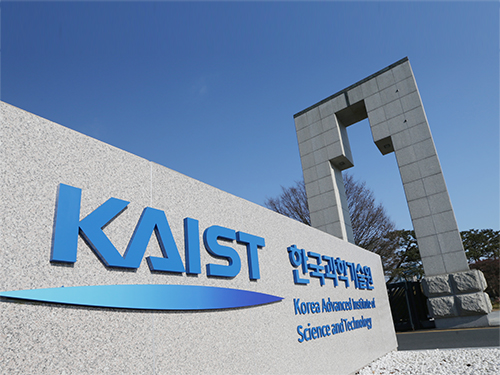 KAIST Ranked 40th in the QS World University Rankings
KAIST ranked 40th in the 2018 QS World University Rankings, one place higher than last year. According to the QS (Quacquarelli Symonds) World’s Top 100 universities released on June 7, KAIST is the second highest ranked Korean university among the five Korean universities listed, following Seoul National University which ranked 36th.
KAIST displayed outstanding performance by ranking 16th in citations per faculty. In the 2018 rankings, universities that are strong in science, technology, and engineering claimed some of the highest positions. MIT topped the list and Caltech took fourth, ETH Zurich seventh, followed by Imperial College London which took eighth.
According to the analysis compiled by QS, universities focusing on science and technology are dominating the global universities rankings. This tendency comes from the fact that engineering schools have an advantage when evaluating the quality of research according to the number of citations per faculty member.
Provost O Ok Park predicts that science and technology will be key players in the Fourth Industrial Revolution era. “In the coming years, universities that excel in multi and interdisciplinary research will lead future growth. KAIST also continues to focus on transdisciplinary education and research,” he said.
2018.06.07 View 5493
KAIST Ranked 40th in the QS World University Rankings
KAIST ranked 40th in the 2018 QS World University Rankings, one place higher than last year. According to the QS (Quacquarelli Symonds) World’s Top 100 universities released on June 7, KAIST is the second highest ranked Korean university among the five Korean universities listed, following Seoul National University which ranked 36th.
KAIST displayed outstanding performance by ranking 16th in citations per faculty. In the 2018 rankings, universities that are strong in science, technology, and engineering claimed some of the highest positions. MIT topped the list and Caltech took fourth, ETH Zurich seventh, followed by Imperial College London which took eighth.
According to the analysis compiled by QS, universities focusing on science and technology are dominating the global universities rankings. This tendency comes from the fact that engineering schools have an advantage when evaluating the quality of research according to the number of citations per faculty member.
Provost O Ok Park predicts that science and technology will be key players in the Fourth Industrial Revolution era. “In the coming years, universities that excel in multi and interdisciplinary research will lead future growth. KAIST also continues to focus on transdisciplinary education and research,” he said.
2018.06.07 View 5493 -
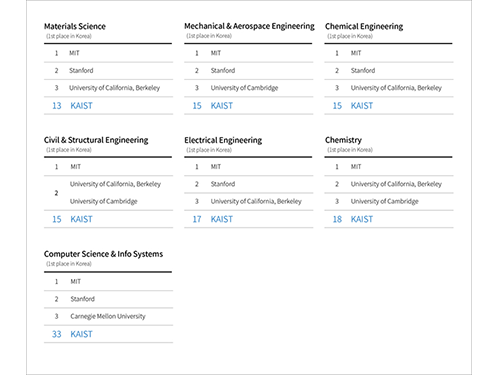 6 Subjects of KAIST Ranked in the Top 20 in the World
Six disciplines of KAIST have emerged among the top 20 in the world. The 2017 QS World University Rankings by Subject rated Materials Science at KAIST 13th in the global ranking. Other subjects ranked within top 20 include Chemical and Biomolecular Engineering (15th), Civil and Environmental Engineering (15th), Mechanical and Aerospace Engineering (15th), Electrical Engineering (17th), and Chemistry (18th). This year, two more disciplines advanced into the top 20 from four in 2016.
QS ranked KAIST as the top science and technology research university in Korea. KAIST earned the highest global rankings among Korean universities in the following seven areas: Materials Science and Engineering (13th), Chemical and Biomolecular Engineering (15th), Civil and Environmental Engineering (15th), Mechanical and Aerospace Engineering (15th), Electrical Engineering (17th), Chemistry (18th), and the School of Computing (33th). In addition, two more disciplines of Physics (44th) and Mathematical Sciences (47th) were ranked second among domestic universities.
The London-based university ranking by Quacquarelli Symonds, Ltd. announced the global university ranking by 46 subjects on March 8. QS rankings are based on academic reputation, employer reputation, the number of research citations, and research accomplishment index (H-index).
2017.03.09 View 6143
6 Subjects of KAIST Ranked in the Top 20 in the World
Six disciplines of KAIST have emerged among the top 20 in the world. The 2017 QS World University Rankings by Subject rated Materials Science at KAIST 13th in the global ranking. Other subjects ranked within top 20 include Chemical and Biomolecular Engineering (15th), Civil and Environmental Engineering (15th), Mechanical and Aerospace Engineering (15th), Electrical Engineering (17th), and Chemistry (18th). This year, two more disciplines advanced into the top 20 from four in 2016.
QS ranked KAIST as the top science and technology research university in Korea. KAIST earned the highest global rankings among Korean universities in the following seven areas: Materials Science and Engineering (13th), Chemical and Biomolecular Engineering (15th), Civil and Environmental Engineering (15th), Mechanical and Aerospace Engineering (15th), Electrical Engineering (17th), Chemistry (18th), and the School of Computing (33th). In addition, two more disciplines of Physics (44th) and Mathematical Sciences (47th) were ranked second among domestic universities.
The London-based university ranking by Quacquarelli Symonds, Ltd. announced the global university ranking by 46 subjects on March 8. QS rankings are based on academic reputation, employer reputation, the number of research citations, and research accomplishment index (H-index).
2017.03.09 View 6143 -
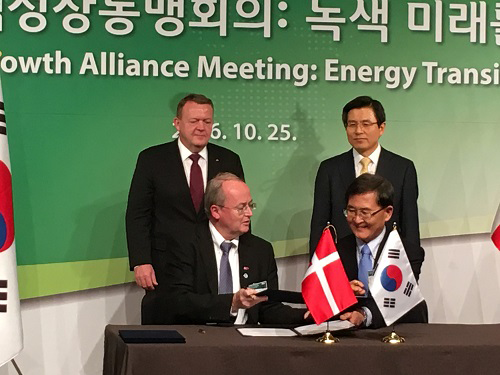 MOU between KAIST and DTU Signed
KAIST and the Technical University of Denmark (DTU) signed a memorandum of understanding (MOU) to cooperate in the areas of startup, student exchange, and joint research on October 25, 2016 at the Embassy of Denmark in Seoul, Korea. Under the agreement, KAIST and DTU will exchange students and researchers through startup programs and continue to collaborating in education and research.
The MOU was facilitated during the Green Growth Alliance Meeting and Energy Seminar hosted by the Danish embassy, in which Danish Prime Minister Lars Løkke Rasmussen participated.
President Steve Kang of KAIST, who fostered the agreement, said,
“DTU has been one of our strategic partners in Europe. We have been working closely with them on academic exchanges and research collaborations, but now with the expansion of our cooperation into entrepreneurship, we will create momentum to spur startups in both schools. To support such activities, we will use KAIST’s experiences acquired from operating the K-School, an entrepreneurship graduate school, and the Institute of KAIST Entrepreneurship. DTU will also share their knowledge on startup programs including SkyLab and StartDTU. I believe this will become another successful alliance between the two universities.”
As of October 2016, KAIST has made 18 agreements with DTU, exchanging 120 students in the past three years and implementing various joint seminars and conferences for academic and research exchanges.
Established in 1829, DTU has been a leading science and technology university in Denmark. It ranked 109 in the QS World University Rankings 2016 and 46th in its subject rankings in engineering and technology.
In the picture below, President Steve Kang of KAIST (right) and Senior Vice President Martin P. Bendsøe of the Technical University of Denmark (left) are signing an agreement for academic and research cooperation.
2016.10.27 View 8769
MOU between KAIST and DTU Signed
KAIST and the Technical University of Denmark (DTU) signed a memorandum of understanding (MOU) to cooperate in the areas of startup, student exchange, and joint research on October 25, 2016 at the Embassy of Denmark in Seoul, Korea. Under the agreement, KAIST and DTU will exchange students and researchers through startup programs and continue to collaborating in education and research.
The MOU was facilitated during the Green Growth Alliance Meeting and Energy Seminar hosted by the Danish embassy, in which Danish Prime Minister Lars Løkke Rasmussen participated.
President Steve Kang of KAIST, who fostered the agreement, said,
“DTU has been one of our strategic partners in Europe. We have been working closely with them on academic exchanges and research collaborations, but now with the expansion of our cooperation into entrepreneurship, we will create momentum to spur startups in both schools. To support such activities, we will use KAIST’s experiences acquired from operating the K-School, an entrepreneurship graduate school, and the Institute of KAIST Entrepreneurship. DTU will also share their knowledge on startup programs including SkyLab and StartDTU. I believe this will become another successful alliance between the two universities.”
As of October 2016, KAIST has made 18 agreements with DTU, exchanging 120 students in the past three years and implementing various joint seminars and conferences for academic and research exchanges.
Established in 1829, DTU has been a leading science and technology university in Denmark. It ranked 109 in the QS World University Rankings 2016 and 46th in its subject rankings in engineering and technology.
In the picture below, President Steve Kang of KAIST (right) and Senior Vice President Martin P. Bendsøe of the Technical University of Denmark (left) are signing an agreement for academic and research cooperation.
2016.10.27 View 8769 -
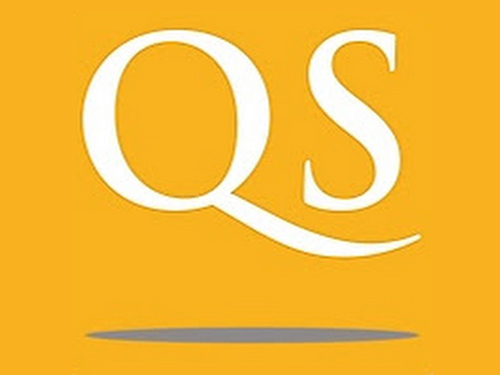 KAIST Ranks 13th in Engineering and Technology and 43rd in Overall Ranking in the 2015 QS World University Rankings
For the first time, the university has broken into the ranks of top 50 global universities since the first release of the rankings in 2004. The 2015 QS World University Rankings were released on September 15, 2015. Overall, KAIST ranked 43rd, advancing eight steps up from last year’s results. Its engineering and technology rank now places it 13th in the global rankings, but it is first in Korea's rankings. Both represent the highest record KAIST has ever attained since the QS Rankings began in 2004. The QS Rankings uses six performance indicators to assess universities’ global reputation, research impact, staffing levels, and international complexion. The indicators are: academic reputation (40%), employer reputation (10%), student-to-faculty ratio (20%), number of citations per faculty publications (20%), international to domestic faculty ratio (5%), and international to domestic student ratio (5%). The Massachusetts Institute of Technology (MIT) topped the 2015 list, with Harvard University coming in second place. The University of Cambridge and Stanford University jointly ranked third. For details on the 2015 QS World University Rankings, see http://www.topuniversities.com/university-rankings-articles/world-university-rankings/qs-world-university-rankings-201516-out-now.
2015.09.17 View 5492
KAIST Ranks 13th in Engineering and Technology and 43rd in Overall Ranking in the 2015 QS World University Rankings
For the first time, the university has broken into the ranks of top 50 global universities since the first release of the rankings in 2004. The 2015 QS World University Rankings were released on September 15, 2015. Overall, KAIST ranked 43rd, advancing eight steps up from last year’s results. Its engineering and technology rank now places it 13th in the global rankings, but it is first in Korea's rankings. Both represent the highest record KAIST has ever attained since the QS Rankings began in 2004. The QS Rankings uses six performance indicators to assess universities’ global reputation, research impact, staffing levels, and international complexion. The indicators are: academic reputation (40%), employer reputation (10%), student-to-faculty ratio (20%), number of citations per faculty publications (20%), international to domestic faculty ratio (5%), and international to domestic student ratio (5%). The Massachusetts Institute of Technology (MIT) topped the 2015 list, with Harvard University coming in second place. The University of Cambridge and Stanford University jointly ranked third. For details on the 2015 QS World University Rankings, see http://www.topuniversities.com/university-rankings-articles/world-university-rankings/qs-world-university-rankings-201516-out-now.
2015.09.17 View 5492 -
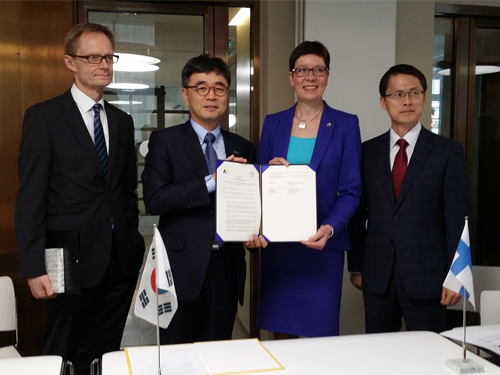 KAIST to Kick-Start the Exchange of Young Researchers with Northern European Universities
KAIST promotes research exchange and cooperation with three universities in Northern Europe.
KAIST has signed a letter of intent (LOI) for the mutual exchange of young researchers and cooperation to collaborate with KTH Royal Institute of Technology and Lund University, both based in Sweden on June 2, 2015, and with Aalto University in Finland on June 4, 2015.
This LOI was the result of the cooperative projects of Korea-Sweden and Korea-Finland Joint Committees on Science and Technology supervised by the Ministry of Science, ICT and Future Planning of Korea.
As agreed in the LOI, KAIST will conduct joint research projects with the three universities by providing students and researchers with opportunities to visit each other through internship programs and workshops and by sharing information on education and research.
Sung-Hyon Mayeng, the Associate Vice President of the International Relations Office at KAIST, said, “It’s an encouraging sign that universities and governments recognize the importance of increasing exchanges among academic and research communities. Expecting more vibrant relationships to be formed between KAIST and the three northern European universities in coming years, I hope that today’s agreement becomes a good basis to spur technological innovations that will not only benefit the regions but also the world.”
Established in 1827, the KTH Royal Institute of Technology is the largest and oldest technical university in Sweden, accounting for one-third of the nation’s technical research and engineering education capacity at university level. The university offers education and research programs from natural sciences to all branches of engineering including architecture, industrial management, and urban planning. According to the QS World University Rankings in 2014, KTH Royal Institute of Technology ranked 27th in engineering and 1st in Northern Europe.
Lund University, Sweden, is one of the oldest and most prestigious universities in northern Europe, consistently ranking among the world’s top 100 universities. In particular, its biological sciences and engineering have shown great strength, placing within the top 60 universities by the Times Higher Education (THE) World University Rankings. The university also receives the largest amount of research funding from the Swedish government.
Aalto University in Finland was created as a merger of three leading Finnish universities: the Helsinki University of Technology (established 1849), the Helsinki School of Economics (established 1904), and the University of Art and Design Helsinki (established 1871). The university nurtures the close collaborations across science, business, and arts to foster multi-disciplinary education and research.
2015.06.04 View 10187
KAIST to Kick-Start the Exchange of Young Researchers with Northern European Universities
KAIST promotes research exchange and cooperation with three universities in Northern Europe.
KAIST has signed a letter of intent (LOI) for the mutual exchange of young researchers and cooperation to collaborate with KTH Royal Institute of Technology and Lund University, both based in Sweden on June 2, 2015, and with Aalto University in Finland on June 4, 2015.
This LOI was the result of the cooperative projects of Korea-Sweden and Korea-Finland Joint Committees on Science and Technology supervised by the Ministry of Science, ICT and Future Planning of Korea.
As agreed in the LOI, KAIST will conduct joint research projects with the three universities by providing students and researchers with opportunities to visit each other through internship programs and workshops and by sharing information on education and research.
Sung-Hyon Mayeng, the Associate Vice President of the International Relations Office at KAIST, said, “It’s an encouraging sign that universities and governments recognize the importance of increasing exchanges among academic and research communities. Expecting more vibrant relationships to be formed between KAIST and the three northern European universities in coming years, I hope that today’s agreement becomes a good basis to spur technological innovations that will not only benefit the regions but also the world.”
Established in 1827, the KTH Royal Institute of Technology is the largest and oldest technical university in Sweden, accounting for one-third of the nation’s technical research and engineering education capacity at university level. The university offers education and research programs from natural sciences to all branches of engineering including architecture, industrial management, and urban planning. According to the QS World University Rankings in 2014, KTH Royal Institute of Technology ranked 27th in engineering and 1st in Northern Europe.
Lund University, Sweden, is one of the oldest and most prestigious universities in northern Europe, consistently ranking among the world’s top 100 universities. In particular, its biological sciences and engineering have shown great strength, placing within the top 60 universities by the Times Higher Education (THE) World University Rankings. The university also receives the largest amount of research funding from the Swedish government.
Aalto University in Finland was created as a merger of three leading Finnish universities: the Helsinki University of Technology (established 1849), the Helsinki School of Economics (established 1904), and the University of Art and Design Helsinki (established 1871). The university nurtures the close collaborations across science, business, and arts to foster multi-disciplinary education and research.
2015.06.04 View 10187 -
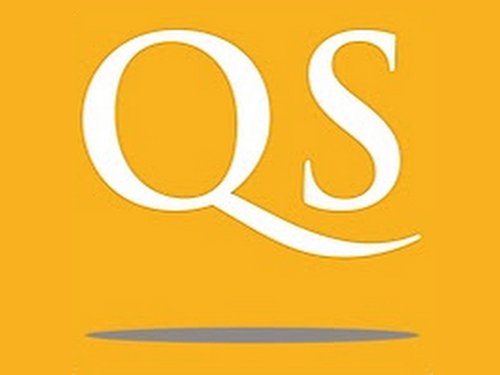 2015 QS World University Rankings by Subject: KAIST's Chemical Engineering ranks 17th and 19th for Materials Science in the World
Chemical Engineering (1st in Korea)
1
MIT (US)
2
UC Berkeley (US)
3
Stanford University (US)
4
University of Cambridge (UK)
5
National University of Singapore (Singapore)
17
KAIST (Korea)
Materials Science and Engineering (1st in Korea)
1
MIT (US)
2
Stanford University (US)
3
UC Berkeley (US)
4
University of Cambridge (UK)
5
North Western University (US)
19
KAIST (Korea)
Electrical and Electronic Engineering (1st in Korea)
1
MIT (US)
2
Stanford University (US)
3
UC Berkeley (US)
4
Harvard University (US)
5
ETH Zurich – Swiss Federal Institute of Technology (Switzerland)
22
KAIST (Korea)
Civil and Structural Engineering (1st in Korea)
1
MIT (US)
2
Delft University of Technology (The Netherlands)
3
National University of Singapore (Singapore)
4
Imperial College London (UK)
5
University of Cambridge (UK)
22
KAIST (Korea)
Mechanical, Aeronautical and Manufacturing Engineering (1st in Korea)
1
MIT (US)
2
Stanford University (US)
3
University of Cambridge (UK)
4
UC Berkeley (US)
5
Michigan University (US)
26
KAIST (Korea)
Chemistry (2nd in Korea)
1
MIT (US)
2
UC Berkeley (US)
3
University of Cambridge (UK)
4
Harvard University (US)
5
University of Oxford (UK)
26
KAIST (Korea)
Computer Science and Information Systems (1st in Korea)
1
MIT (US)
2
Stanford University (US)
3
University of Oxford (UK)
4
Carnegie Mellon University (US)
Harvard University (US)
39
KAIST (Korea)
The QS World University Rankings released its 2015 rankings by subject on April 29, 2015.
According to the rankings, KAIST’s Chemical and Biomolecular Engineering and Materials Science Engineering were listed in the top 20 global universities, 17th and 19th, respectively.
KAIST took first place in six subjects among Korean universities, including electrical and electronic engineering; civil and structural engineering; mechanical, aeronautical and manufacturing engineering; and computer science and information systems.
The QS World University Rankings by Subject highlights the world’s top universities in a range of popular subject areas, covering 36 subjects as of this year. Published annually since 2011, the rankings are based on academic reputation, employer reputation, citation count, and research impact.
For a full list of the rankings: http://www.topuniversities.com/subject-rankings/2015
2015.04.29 View 6319
2015 QS World University Rankings by Subject: KAIST's Chemical Engineering ranks 17th and 19th for Materials Science in the World
Chemical Engineering (1st in Korea)
1
MIT (US)
2
UC Berkeley (US)
3
Stanford University (US)
4
University of Cambridge (UK)
5
National University of Singapore (Singapore)
17
KAIST (Korea)
Materials Science and Engineering (1st in Korea)
1
MIT (US)
2
Stanford University (US)
3
UC Berkeley (US)
4
University of Cambridge (UK)
5
North Western University (US)
19
KAIST (Korea)
Electrical and Electronic Engineering (1st in Korea)
1
MIT (US)
2
Stanford University (US)
3
UC Berkeley (US)
4
Harvard University (US)
5
ETH Zurich – Swiss Federal Institute of Technology (Switzerland)
22
KAIST (Korea)
Civil and Structural Engineering (1st in Korea)
1
MIT (US)
2
Delft University of Technology (The Netherlands)
3
National University of Singapore (Singapore)
4
Imperial College London (UK)
5
University of Cambridge (UK)
22
KAIST (Korea)
Mechanical, Aeronautical and Manufacturing Engineering (1st in Korea)
1
MIT (US)
2
Stanford University (US)
3
University of Cambridge (UK)
4
UC Berkeley (US)
5
Michigan University (US)
26
KAIST (Korea)
Chemistry (2nd in Korea)
1
MIT (US)
2
UC Berkeley (US)
3
University of Cambridge (UK)
4
Harvard University (US)
5
University of Oxford (UK)
26
KAIST (Korea)
Computer Science and Information Systems (1st in Korea)
1
MIT (US)
2
Stanford University (US)
3
University of Oxford (UK)
4
Carnegie Mellon University (US)
Harvard University (US)
39
KAIST (Korea)
The QS World University Rankings released its 2015 rankings by subject on April 29, 2015.
According to the rankings, KAIST’s Chemical and Biomolecular Engineering and Materials Science Engineering were listed in the top 20 global universities, 17th and 19th, respectively.
KAIST took first place in six subjects among Korean universities, including electrical and electronic engineering; civil and structural engineering; mechanical, aeronautical and manufacturing engineering; and computer science and information systems.
The QS World University Rankings by Subject highlights the world’s top universities in a range of popular subject areas, covering 36 subjects as of this year. Published annually since 2011, the rankings are based on academic reputation, employer reputation, citation count, and research impact.
For a full list of the rankings: http://www.topuniversities.com/subject-rankings/2015
2015.04.29 View 6319 -
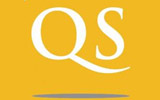 QS World University Rankings 2014: KAIST ranked 17th in Engineering and Technology
The QS World University Rankings 2014 were released on October 16, 2014. KAIST ranked 51st among the top 100 global universities which included Massachusetts Institute of Technology (MIT), University of Cambridge, Imperial College London, Harvard University, and University of Oxford. This year’s QS ranking is the highest record ever achieved by KAIST, a great leap from last year’s 60th.
KAIST’s forte in engineering and technology remains high, ranking 17th out of hundreds of universities around the world. Since 2004, KAIST has kept the number one place in this subject within Korea.
Since first being compiled in 2004, the QS rankings have expanded to feature more than 800 universities around the world, and the top 400 universities are given individual ranking positions. The rankings are compiled based on six indicators: academic reputation, employer reputation, faculty/student ratio, citations per faculty, international student ratio, and international staff ratio.
KAIST has earned high scores in three indicators: citations per faculty, academic reputation, and employer reputation.
President Steve Kang of KAIST said, “With concerted efforts made by all members of the KAIST community, faculty and students in particular, we have received a good result in the global rankings. Without dwelling on this result, we will continue to strive toward making KAIST one of the most sought-after universities in the world, academically praised and technologically innovative.”
2014.09.16 View 9682
QS World University Rankings 2014: KAIST ranked 17th in Engineering and Technology
The QS World University Rankings 2014 were released on October 16, 2014. KAIST ranked 51st among the top 100 global universities which included Massachusetts Institute of Technology (MIT), University of Cambridge, Imperial College London, Harvard University, and University of Oxford. This year’s QS ranking is the highest record ever achieved by KAIST, a great leap from last year’s 60th.
KAIST’s forte in engineering and technology remains high, ranking 17th out of hundreds of universities around the world. Since 2004, KAIST has kept the number one place in this subject within Korea.
Since first being compiled in 2004, the QS rankings have expanded to feature more than 800 universities around the world, and the top 400 universities are given individual ranking positions. The rankings are compiled based on six indicators: academic reputation, employer reputation, faculty/student ratio, citations per faculty, international student ratio, and international staff ratio.
KAIST has earned high scores in three indicators: citations per faculty, academic reputation, and employer reputation.
President Steve Kang of KAIST said, “With concerted efforts made by all members of the KAIST community, faculty and students in particular, we have received a good result in the global rankings. Without dwelling on this result, we will continue to strive toward making KAIST one of the most sought-after universities in the world, academically praised and technologically innovative.”
2014.09.16 View 9682 -
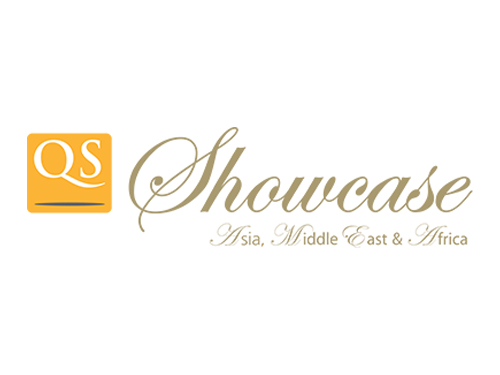 KAIST Featured in the 2014 QS Showcase-AMEA (Asia, Middle East, and Africa)
The QS World University Rankings has released the fourth Edition of QS Showcase-AMEA (Asia, Middle East, and Africa) in January 2014, both in print and online, which is an annual magazine presenting the progress of the top universities in these regions, as well as highlighting their breakthroughs and improvements.
The 2014 QS Showcase-AMEA included an interview with President Steve Kang, covering KAIST and its role in Korea, student mobility, as well as Korean higher education.
For the interview, please go to: http://qsshowcase.com/main/korea-casts-its-net-more-widely-to-stay-on-top/ .
2014.06.07 View 8089
KAIST Featured in the 2014 QS Showcase-AMEA (Asia, Middle East, and Africa)
The QS World University Rankings has released the fourth Edition of QS Showcase-AMEA (Asia, Middle East, and Africa) in January 2014, both in print and online, which is an annual magazine presenting the progress of the top universities in these regions, as well as highlighting their breakthroughs and improvements.
The 2014 QS Showcase-AMEA included an interview with President Steve Kang, covering KAIST and its role in Korea, student mobility, as well as Korean higher education.
For the interview, please go to: http://qsshowcase.com/main/korea-casts-its-net-more-widely-to-stay-on-top/ .
2014.06.07 View 8089 -
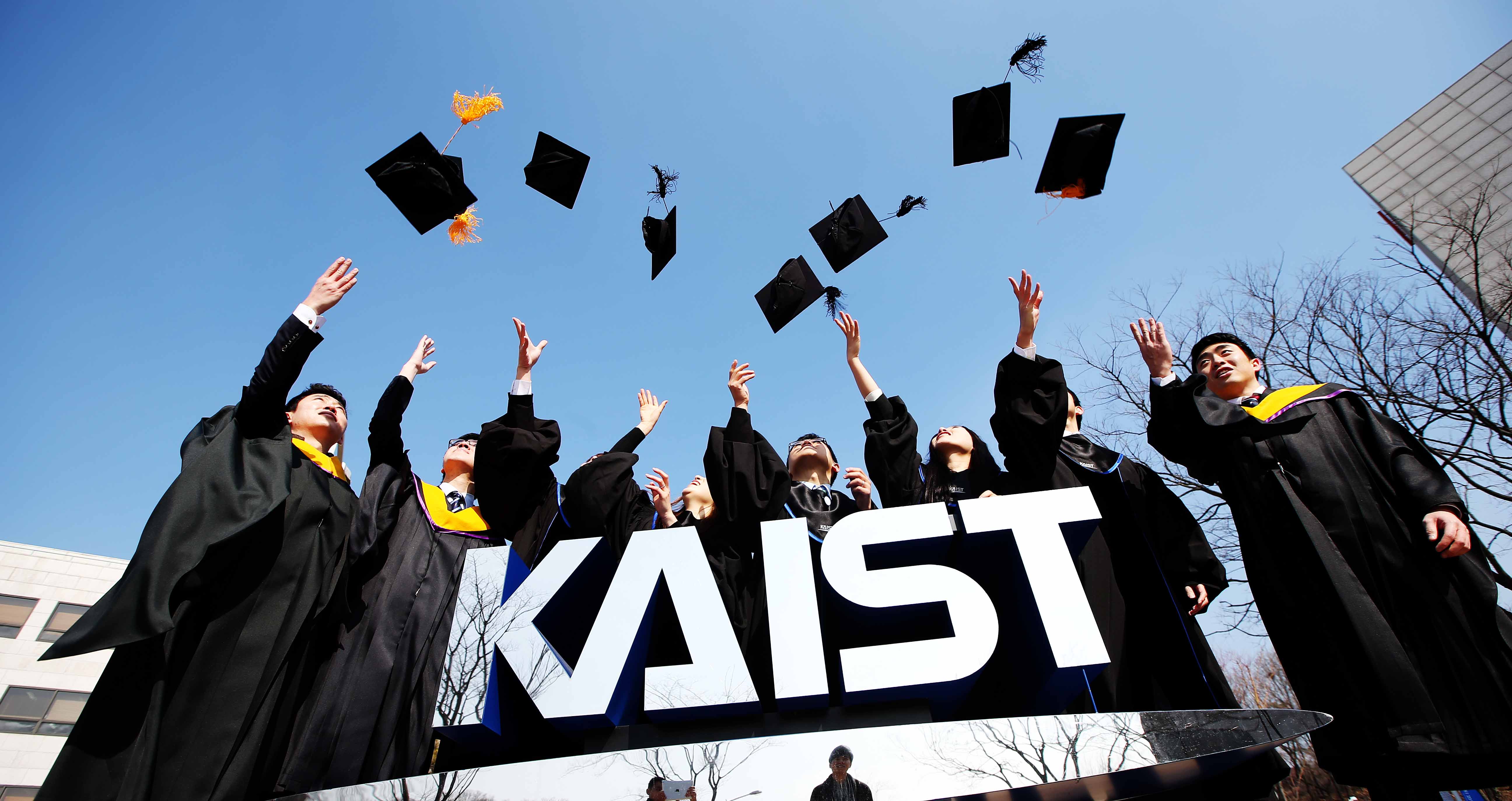 Quacquarelli Symonds (QS) World University Rankings by Subject 2014
The QS
World University Rankings are annual university rankings published by
Quacquarelli Symonds (QS) which provides the overall rankings of top global
universities as well as the rankings for individual subjects. The 2014 QS World
University Rankings by Subject is a comprehensive guide to the world’s best universities
in 30 popular subjects of 5 academic disciplines: arts & humanities,
engineering & technology, life sciences & medicine, natural sciences,
and social sciences.
According
to the 2014 subject rankings, released on February 26, KAIST made the list of top
50 universities in 9 subjects: physics & astronomy; materials sciences;
chemistry; chemical engineering; mechanical, aeronautical & manufacturing
engineering; electrical & electronic engineering; civil & structural engineering;
computer science & information systems; and biological sciences.
Among
them, KAIST was ranked number one in Korea for 5 subjects: materials sciences
(16th); mechanical, aeronautical & manufacturing engineering (21st);
civil & structural engineering (32nd); computer science &
information systems (36th), and biological sciences (43rd).
For basic sciences, KAIST has made good progress as well. For example, in
mathematics, KAIST took first place in Korea and was ranked in the 51st-100th
of the world’s top universities. Another notable result was that its business college
in Seoul campus, a relatively new addition to KAIST, made the rankings list of
51st-100th in accounting & finance.
The 2014
QS subject rankings used the following criteria for its evaluation of
university performance: a survey of academic and employer reputation, citations
per paper, inclusion of specialists, and the h-index, known as the Hirsch index or Hirsch number, which was
suggested by Jorge E. Hirsch, a physicist at the University of California in
San Diego, as a tool for determining theoretical physicists’ relative quality.
Today, the h-index is used to measure
both the productivity and impact of the published work of a scientist or
scholar.
2014.02.28 View 12234
Quacquarelli Symonds (QS) World University Rankings by Subject 2014
The QS
World University Rankings are annual university rankings published by
Quacquarelli Symonds (QS) which provides the overall rankings of top global
universities as well as the rankings for individual subjects. The 2014 QS World
University Rankings by Subject is a comprehensive guide to the world’s best universities
in 30 popular subjects of 5 academic disciplines: arts & humanities,
engineering & technology, life sciences & medicine, natural sciences,
and social sciences.
According
to the 2014 subject rankings, released on February 26, KAIST made the list of top
50 universities in 9 subjects: physics & astronomy; materials sciences;
chemistry; chemical engineering; mechanical, aeronautical & manufacturing
engineering; electrical & electronic engineering; civil & structural engineering;
computer science & information systems; and biological sciences.
Among
them, KAIST was ranked number one in Korea for 5 subjects: materials sciences
(16th); mechanical, aeronautical & manufacturing engineering (21st);
civil & structural engineering (32nd); computer science &
information systems (36th), and biological sciences (43rd).
For basic sciences, KAIST has made good progress as well. For example, in
mathematics, KAIST took first place in Korea and was ranked in the 51st-100th
of the world’s top universities. Another notable result was that its business college
in Seoul campus, a relatively new addition to KAIST, made the rankings list of
51st-100th in accounting & finance.
The 2014
QS subject rankings used the following criteria for its evaluation of
university performance: a survey of academic and employer reputation, citations
per paper, inclusion of specialists, and the h-index, known as the Hirsch index or Hirsch number, which was
suggested by Jorge E. Hirsch, a physicist at the University of California in
San Diego, as a tool for determining theoretical physicists’ relative quality.
Today, the h-index is used to measure
both the productivity and impact of the published work of a scientist or
scholar.
2014.02.28 View 12234 -
 The Huffington Post, January 30th, 2014: The Top Young Universities in the World, According to QS Rankings
KAIST was ranked third among the “QS Top 50 Under 50,” a ranking of the world’s top 50 universities established within the last 50 years, which was based on the highest performing young universities in the 2013/14 QS World University Rankings. For details, please read the news article below:
The Huffington Post, January 30th, 2014: The Top Young Universities in the World, According to QS Rankings: http://www.huffingtonpost.co.uk/2014/01/30/top-young-universities-in-world-qs-rankings_n_4693918.html
2014.02.03 View 7394
The Huffington Post, January 30th, 2014: The Top Young Universities in the World, According to QS Rankings
KAIST was ranked third among the “QS Top 50 Under 50,” a ranking of the world’s top 50 universities established within the last 50 years, which was based on the highest performing young universities in the 2013/14 QS World University Rankings. For details, please read the news article below:
The Huffington Post, January 30th, 2014: The Top Young Universities in the World, According to QS Rankings: http://www.huffingtonpost.co.uk/2014/01/30/top-young-universities-in-world-qs-rankings_n_4693918.html
2014.02.03 View 7394 -
 KAIST ranked 60th in the 2013 QS World University Rankings
KAST achieved the highest ranking in its history in the QS World University Rankings by Quacquarelli Symonds.
The British company, which specializes in education, has ranked KAIST 60th in the world in its 2013 QS World University Rankings, as announced on its homepage on September 10th. KAIST was ranked 198th in 2006 and was promoted to 63rd in 2012.
This year, MIT was first, followed by Harvard in second, Cambridge in third, University College of London in fourth, and Imperial College in fifth.
Seoul National University, in 35th place, was ranked the highest among Korean universities. Six other Korean universities were included in the top 200, including KAIST, POSTECH which ranked 107th, Yonsei University in 114th place, Korea University in 145th, and Sungkyunkwan University in 162nd.
QS World University Rankings are assessed based on six different criteria: academic reputation (40%), citations per faculty (20%), student-to-faculty ratio (20%), employer reputation (10%), international student ratio (5%), and foreign faculty ratio (5%).
KAIST improved over 10 points from last year in the areas of employer reputation and citations per faculty.
“This has been accomplished through the challenging spirit and passion of the KAIST family including the students and the faculty. All possible support will be provided for them to excel in research and education”, said the president, Steve Kang.
KAIST also ranked sixth in the 2013 Chosun Daily Newspaper Asian University Rankings and first in the Chungang Daily Newspaper University Rankings for five years from 2008 to 2012.
2013.11.04 View 6771
KAIST ranked 60th in the 2013 QS World University Rankings
KAST achieved the highest ranking in its history in the QS World University Rankings by Quacquarelli Symonds.
The British company, which specializes in education, has ranked KAIST 60th in the world in its 2013 QS World University Rankings, as announced on its homepage on September 10th. KAIST was ranked 198th in 2006 and was promoted to 63rd in 2012.
This year, MIT was first, followed by Harvard in second, Cambridge in third, University College of London in fourth, and Imperial College in fifth.
Seoul National University, in 35th place, was ranked the highest among Korean universities. Six other Korean universities were included in the top 200, including KAIST, POSTECH which ranked 107th, Yonsei University in 114th place, Korea University in 145th, and Sungkyunkwan University in 162nd.
QS World University Rankings are assessed based on six different criteria: academic reputation (40%), citations per faculty (20%), student-to-faculty ratio (20%), employer reputation (10%), international student ratio (5%), and foreign faculty ratio (5%).
KAIST improved over 10 points from last year in the areas of employer reputation and citations per faculty.
“This has been accomplished through the challenging spirit and passion of the KAIST family including the students and the faculty. All possible support will be provided for them to excel in research and education”, said the president, Steve Kang.
KAIST also ranked sixth in the 2013 Chosun Daily Newspaper Asian University Rankings and first in the Chungang Daily Newspaper University Rankings for five years from 2008 to 2012.
2013.11.04 View 6771